Rwanda: Current President Kagame confessed ordering predecessor’s plane shot down
October 1, 2011
Paul Kagame visits Bejamin Netanyahou in Israel, October 1996.
Kagame’s former ambassador to the U.S. makes startling announcement about event that triggered Rwandan Genocide
This interview of Theogene Rudasingwa by Minister of Information JR was broadcast Dec. 8 on KPFA’s Hard Knock Radio
by Theogene Rudasingwa
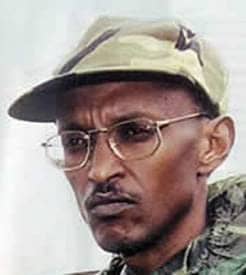
Now revealing in this article that Paul Kagame (above), who is credited with ending the Rwandan Genocide, confessed that he, in effect, started it is Dr. Theogene Rudasingwa, former secretary general of the Rwandan Patriotic Front (RPF), ambassador of Rwanda to the United States and chief of staff for President Kagame.
On April 6, 1994, at 8:25 p.m., the Falcon 50 jet of the president of the Republic of Rwanda, registration number 9XR-NN, on its return from a summit meeting in Tanzania, as it was on approach from Dar-es-Salaam to Kanombe International Airport in Kigali, Rwanda, was shot down. All on board, including President Juvenal Habyarimana, President Cyprien Ntaryamira of Burundi, their entire entourage and flight crew, died.
The death of President Juvenal Habyarimana triggered the start of genocide that targeted Tutsi and Hutu moderates and the resumption of civil war between the RPF and the government of Rwanda. The RPF’s sad and false narrative from that time on has been that Hutu extremists within President Habyarimana’s camp shot down the plane to derail the implementation of the Arusha Peace Agreement and to find a pretext to start the genocide in which over 800,000 Rwandans died in just 100 days. This narrative has become a predominant one in some international circles, among scholars, and in some human rights organizations.
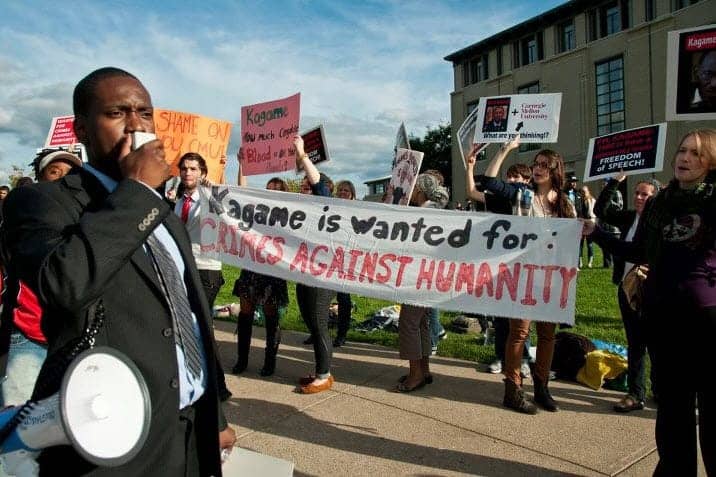
Outside Carnegie Mellon University while President Paul Kagame was speaking inside, Kambale Musavuli, student coordinator for Friends of the Congo, led a demonstration by Rwandan, Congolese and American students denouncing Kagame’s crimes against humanity. – Photo: Lindsay Dill
The political and social atmosphere during the period from the signing of the Arusha Accords in August 1993 was highly explosive, and the nation was on edge. By killing President Habyarimana, Paul Kagame introduced a wild card in an already fragile ceasefire and dangerous situation. This created a powerful trigger, escalating to a tipping point resumption of the civil war, genocide and the region-wide destabilization that has devastated the Great Lakes region since then.
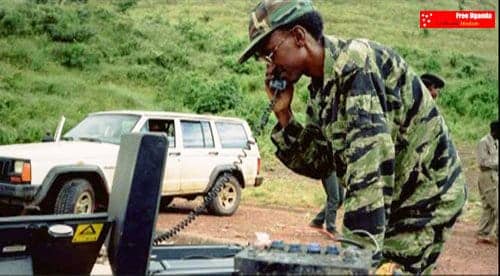
Gen. Kagame uses his satellite phone from the field. The Rwandan Civil War, culminating in the 1994 genocide, had been raging since Kagame’s Rwandan Patriotic Front invaded Rwanda from Uganda in 1990. By assassinating then Rwandan President Habyarimana, Kagame prevented the Arusha Peace Agreement the president had just signed from taking effect.
By killing President Habyarimana, Paul Kagame … created a powerful trigger, escalating to a tipping point resumption of the civil war, genocide and the region-wide destabilization that has devastated the Great Lakes region since then.
President Habyarimana was returning from a peace summit and, by killing him, Kagame demonstrated the highest form of treachery. Second, Kagame, a Tutsi himself, callously gambled away the lives of innocent Tutsi and moderate Hutu who perished in the genocide. While the killing of President Habyarimana, a Hutu, was not a direct cause of the genocide, it provided a powerful motivation and trigger to those who organized, mobilized and executed the genocide against Tutsi and Hutu moderates.
Third, by killing President Habyarimana, Kagame permanently derailed the already fragile Arusha peace process in a dangerous pursuit of absolute power in Rwanda. Kagame feared the letter and spirit of the Arusha Peace Agreement. As the subsequent turn of events has now shown, Kagame does not believe in the unity of Rwandans, democracy, respect of human rights and other fundamental freedoms, the rule of law, power sharing, integrated and accountable security institutions with a national character, and resolving the problem of refugees once and for all. This is what the Arusha Peace Agreement was all about. That is what is lacking in Rwanda today.
Last, but not least, Kagame’s and RPF’s false narrative, denials and deceptions have led to partial justice in Rwanda and at the International Criminal Tribunal for Rwanda, thereby undermining prospects for justice for all Rwandan people, reconciliation and healing. The international community has, knowingly or unknowingly, become an accomplice in Kagame’s systematic and shameful game of deception.
By killing President Habyarimana, Kagame permanently derailed the already fragile Arusha peace process in a dangerous pursuit of absolute power in Rwanda, to which the international community has become an accomplice.
I was never party to the conspiracy to commit this heinous crime. In fact, I first heard about it on BBC around 1:00 a.m. on April 7, 1994, while I was in Kampala, where I had been attending the Pan African Movement conference.
I believe the majority of members of RPF and RPA civilians and combatants, like me, were not party to this murderous conspiracy that was hatched and organized by Paul Kagame and executed on his orders. Nevertheless, I was a secretary general of the RPF, and a major in the rebel army, RPA.
It is in this regard, within the context of collective responsibility and a spirit of truth-telling in search of forgiveness and healing, that I would like to say I am deeply sorry about this loss of life and to ask for forgiveness from the families of Juvenal Habyarimana, Cyprien Ntaryamira, Deogratias Nsabimana, Elie Sagatwa, Thaddee Bagaragaza, Emmanuel Akingeneye, Bernard Ciza, Cyriaque Simbizi, Jacky Heraud, Jean-Pierre Minaberry and Jean-Michel Perrine.
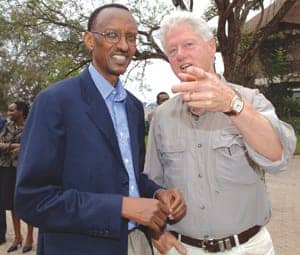
Rwandan President Paul Kagame and former U.S. President Bill Clinton tour Clinton Foundation projects in Rwanda. The two have become close friends, as have the governments of Rwanda and the U.S.
In freely telling the truth before God and the Rwandan people, I fully understand the risk I have undertaken, given Paul Kagame’s legendary vindictiveness and unquenchable thirst for spilling the blood of Rwandans. It is a shared risk that Rwandans bear daily in their quest for freedom and justice for all. Neither power and fame, nor gold and silver, are the motivation for me in these matters of death that have defined our nation for too long.
In freely telling the truth before God and the Rwandan people, I fully understand the risk I have undertaken, given Paul Kagame’s legendary vindictiveness and unquenchable thirst for spilling the blood of Rwandans. But Rwanda cannot rebuild and heal on lies.
Truth cannot wait for tomorrow, because the Rwandan nation is very sick and divided and cannot rebuild and heal on lies. All Rwandans urgently need truth today. Our individual and collective search for truth will set us free. When we are free, we can freely forgive each other and begin to live fully and heal at last.
Dr. Theogene Rudasingwa is a former secretary general of the Rwandan Patriotic Front (RPF), ambassador of Rwanda to the United States and chief of staff for President Paul Kagame.



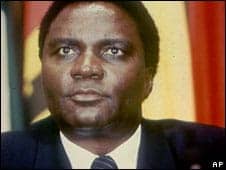
No comments:
Post a Comment